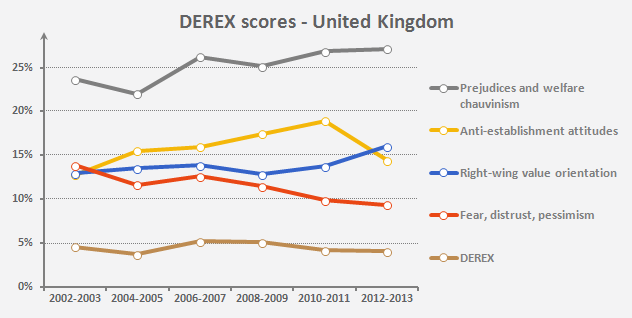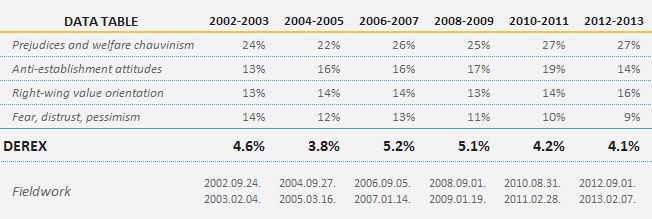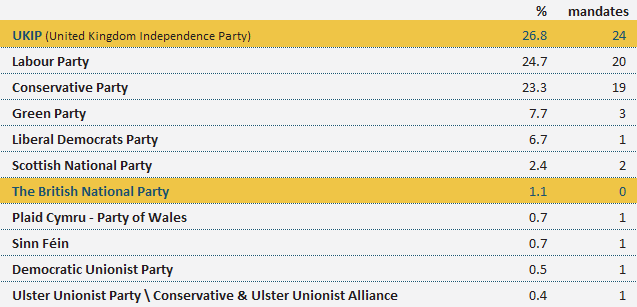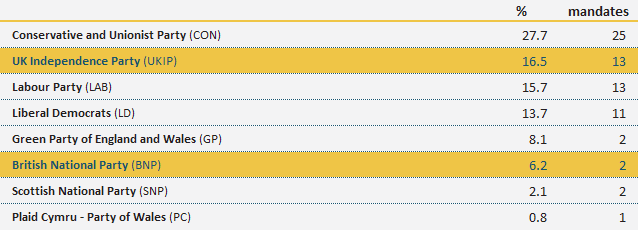United Kingdom
Factsheet
| ETHNIC MINORITIES: | |
|
African: Indian: Pakistan: Roma: |
2.0% 1.8% 1.3% 0.37% |
| RELIGIONS: | |
|
Christian: Muslim: Hindu: |
71.6% 4.6% 1.0% |
| NET MIGRATION: | 1,020,211 |
| POP. GROWTH RATE: | +0.8% |
| GDP GROWTH: | +1.2% |
| GDP PER CAPITA: | 39,093 |
| UNEMPLOYMENT: | 7.9% |


British National Party (BNP)

John Tyndall, a former founder of the National Front, founded the British National Party (BNP) in 1982. Tyndall was a highly controversial figure in British politics, largely because of his former role as deputy leader of the neo-Nazi National Socialist Movement. The party’s most notable electoral successes came in 2006, when it won 12 out of the 13 seats it contested on the Barking and Dagenham local council, and in 2009, when two BNP politicians — including Nick Griffin, the current party leader — were elected to the European Parliament. In 2010, it lost all 12 seats on the council. In the same year, it changed its policy of only allowing white people to be members. The BNP’s trademark issue is its staunch anti-immigration position. While the party is not overtly anti-Islam, in 2009 Griffin said, ‘Islam and our society don’t mix.’ The BNP seeks to end all immigration to the UK, to deport all illegal immigrants, to deport all foreign-born criminals, to reject all asylum seekers who passed safe countries en route to Britain, and to offer resettlement grants to foreigners who are here legally. The BNP claims to want Britain to ‘remain — or return to — the way it has traditionally been’, citing the belief that in less than 60 years, white Britons will be a minority in the UK. Griffin has also courted controversy at various appearances on current affairs programs such as BBC’s Question Time and at universities such as Trinity College Dublin. Despite polling well in some local and European elections, the BNP has yet to achieve a wider electoral breakthrough. Commentators note that a dearth of activism and money has dashed its hopes in the 2011 elections, and that the party has failed to connect with constituents beyond older, less educated voters.
By early 2014 support for the party dropped to under 1%. Its decline is based on serious organizational difficulties, including Nick Griffin’s personal bankruptcy, which led to his expulsion in October 2014. The real stake of at the EP elections may be the very survival of the party; in 2012 one of its two representatives left the organization and simultaneously the party lost a large number of its influential activists, along with 90% of its members. Apart from the categorical rejection of the Union, the party entered the 2014 European campaign focusing on Islam and the topic of the integration of the Roma and the poor from within the Union. In addition, it directly attacks the sleaze of European representatives and “Eurocrats”. Today, the party is at an all time low mainly due to internal splits and the rise of UKIP. Since October 2014, the new BNP acting chairman is Adam Walker.
- Jamie Bartlett et al.: “The New Face of Digital Populism.” Demos: London 2011, p. 96. Available online at http://www.demos.co.uk/files/Demos_OSIPOP_Book-web_03.pdf?1320601634
- Political Capital


Jamie Bartlett et al.: “The New Face of Digital Populism.” Demos: London 2011, p. 100-101. Available online at http://www.demos.co.uk/files/Demos_OSIPOP_Book-web_03.pdf?1320601634


The UK Independence Party was established in 1993 by members of the Anti-Federalist League (AFL) at the London School of Economics to lead Great Britain out of the Union. While the UKIP defines itself as non-racist and non-sectarian, the party drifted to the far right and its first leader, Alan Sked resigned in 1997 saying that the party “is racist and has been infected by the far-right”. Since then the party tried to present itself as a democratic and liberal force and has kept a distance from explicitly extreme-right and racist statements, going as far as expelling a number of racist members. Nonetheless, even before the 2013 local elections several UKIP candidates had links to BNP and other fire-right groups making racist and homophobe statements. Nigel Farage has been at the head of the UKIP party since 2010.
The UKIP’s electoral success can be dated to the early 2000s, thanks primarily to its good showing at the EP elections, while it failed to win a single seat in the House of Commons. In the 1997 general elections UKIP received only 0.3% of votes, trailing the Referendum Party, although in the 1999 EP election it gained 7% and with that 3 mandates. In the national elections the party managed to increase its support court base, and in the 2010 general election is already received 3.1%, although this was still insufficient to win a parliamentary seat. During the European Elections, UKIP won 24 seats, toppling both the conservative party and the labour party. During the national elections however, UKIP was not as successful as had been anticipated and took home 12.6% of the votes. The party builds its campaign around three major topics: opposition to the reduction of energy taxes at home, stemming the flow of migration and calling for referendum on Britain’s of EU membership.
- Jamie Bartlett et al.: “The New Face of Digital Populism.” Demos: London 2011, p. 96. Available online athttp://www.demos.co.uk/files/Demos_OSIPOP_Book-web_03.pdf?1320601634
- Political Capital
Parliamentary elections - May 7, 2015


European Parliamentary elections - May 22, 2014


Parliamentary elections - May 6, 2010


European Parliamentary elections - June 4, 2009

Our thematic websites
Political Capital's analyses and activities in English.
Research and advocacy programme focused on the role conspiracy theorising plays in shaping populist and radical politics.
Our project New electoral system in Hungary: watchdogging, advocacy and raising awareness focuses on the electoral reform in Hungary.
Our blog on political and societal extremism and conspiracy theories.
DEREX website is supported by










